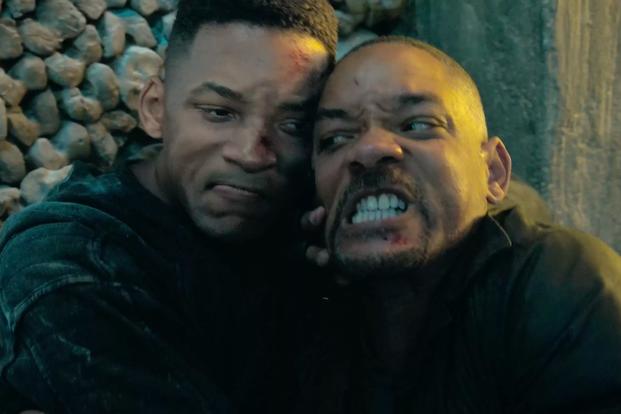Oscar-winning director Ang Lee has gone all-in on his vision for the future of movies, and "Gemini Man" is his latest attempt to mess with audience expectations and bring them over to his side.
Will Smith stars as a Marine Corps veteran who's become a shadow assassin for top secret government agencies. When he tries to retire, his handlers decide that he knows too much and send a young hotshot to take him out.
Turns out that the new guy is actually a clone of Smith's character, Henry Brogan, and "Junior" has been raised as a son by Brogan's former commanding officer Clay Verris (Clive Owen in full bad-guy, scenery-chewing glory). What happens when a Real Marine is confronted by his lab-grown twin? Oorah!
Things like plot and character development are less interesting to Ang Lee than the tools he had to tell the story. Like his previous movie, "Billy Lynn's Long Halftime Walk," Lee shot this movie with digital cameras at a 120 frames-per-second rate. Since 24fps has been the standard for at least a century, the hyperreal visual experience can be disorienting.
Gemini Man is out now on 4K Ultra HD, Blu-ray, DVD and Digital HD. The real viewing experience is the 4K release, which gives home viewers a 60fps image. It turns out that the normal scenes where Will Smith walks around his Georgia home property or sits in a restaurant look weirder than all the CGI-heavy action sequences. It's unlike anything you've seen before, and the whole experience will take some getting used to if Lee's bet on the future is correct.
That's not even counting the scenes featuring the younger version of Will Smith. Smith shot all the scenes as the Junior character with weird headgear and a face full of dots. Then the digital wizards created a 100% digital character based on images of the actor from his "Fresh Prince" youth.
It's amazing and weird and kind of terrifying. The technology is in its earliest days. It's light years beyond what Peter Jackson tried to do with "The Hobbit" movies, and it's impossible to conceive how much it's going to improve over the next decade.
We had a chance to speak with Ben Gervais, the technical supervisor on "Gemini Man" about Lee and the future of cinema.
"What Ang has found is that maybe digital cinema is its own art form, and it can evolve on a separate path from celluloid-based cinema," said Ben. "If we've got the capabilities, why not use them and explore them and see if they can give audiences a different experience?"
"Why don't we find a new aesthetic that corresponds with digital cinema? Because digital is a fundamentally different tool, why don't we treat it for what it is, rather than just using it to mimic what we used to do?" he added.
"Gemini Man" got a notably chilly reception from the movie critics who have long championed Lee's work. Ben observes, "Some of the critics have what I would call a fierce respect for the history of cinema. Sometimes, the emphasis is on the fierce, and anything that is different is not always met with excitement.
"When you look back at the history of art in general ... that's been the case. With any sort of new movements in an art form, frequently it's the critics who are some of the last people to get on board," he said.
Still, Gervais admits that the technology is still in its early stages: "We're craftsman and the first people to admit that we can't always get things perfect. I think we got a lot right with this movie, and we've got enough weight in the industry that I think a lot of people are starting to see the promise of what this technology can give us."
Younger audiences are most likely the key to the new format's acceptance: "You also have to be able to look past the things that we didn't get right. For some people, that comes more easily than others. Obviously, younger people have grown up with video games at 50 frames per second. They've tried VR and have started to participate with media in a different way."
Gervais thinks we're a few years away from mastering the new formats. "It took us a long time to get 24-frame filmmaking right. You look at the history of cinema, and a lot of people feel like the golden age of cinema finally happened in the '70s. There's a lot of really amazing content being made today, but it took us a hundred years to get to this point. And, even still, we make mistakes.
"If you look at the progression from 'The Hobbit' to this film, there's been a huge amount of progression. With this one, we definitely got way more right than we got wrong. It's just a matter of sorting out the last few big bumps and I think we'll be there," he said. "But it's also an adjustment for the audience. I think people aren't used to seeing a movie this way, but once they see a few movies made this way, it will become a little easier for them to see another movie and another movie after that. We'll see the adjustment both on the part of the filmmaker and the viewer."

In a couple of decades, we're certain to look back at movies like "Gemini Man" as signposts of things to come. Martin Scorsese won't be around to complain, and Quentin Tarantino will probably be shouting at the walls at the The Motion Picture and Television Fund's retirement home as he projects his deteriorating 35mm print collection for the thousandth time on his bedroom wall.
This is the future. It's here now, and it's worth a look.















